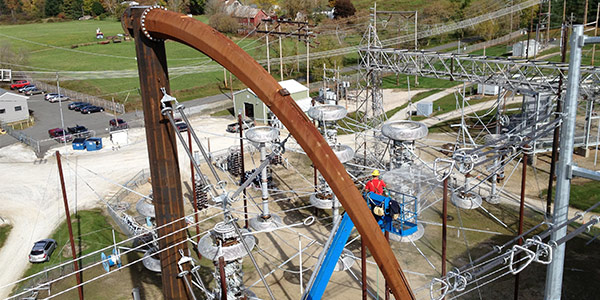MISO executives last week issued dire warnings about the possible fallout if the grid operator doesn’t pursue big ticket transmission projects in its footprint.
Appearing virtually before the Board of Directors’ System Planning Committee (SPC) on March 23, senior staff estimated the long-range transmission package unveiled March 17 could cost anywhere from $30 billion to $100 billion. The portfolio, which includes more than a dozen 345-kV additions, a handful of 500-kV and 765-kV lines and a massive footprint-wide network of DC lines, met stakeholder pushback over the necessity of such a dramatic expansion. (See MISO Reveals Contentious Long-range Tx Project Map.)
Jennifer Curran, vice president of system planning, said MISO sees an “increased urgency” to expand its transmission system given the resource changes it has already experienced, its member utilities’ carbon-reduction goals and the time it takes for a transmission project’s concept to become reality.
Without a long-range transmission plan, generation projects will likely continue to drop out of MISO’s interconnection queue because of high network upgrade costs, Executive Director of System Planning Aubrey Johnson said.
Curran called the long-range plan “a journey, not a destination,” and said staff must still conduct engineering analyses, present business cases and collect more stakeholder feedback. She said MISO is focusing first on system reliability as the resource fleet becomes more intermittent.
“Solutions may be added to or removed, but we think this is an important first step,” Curran said of an early indicative map of transmission solutions.
Stacy Herbert, representing transmission owners on the SPC, said stakeholders may disagree about “how quickly, how much and where,” but it’s undeniable that the changing fleet demands transmission buildout.
MISO President: Think of Flint
MISO President Clair Moeller used Flint, Mich.’s water crisis to warn about the human cost when infrastructure upgrades are neglected.
In Flint, the decisions were always focused on putting off investments at the expense of public health, he said during the board meeting March 25. He reminded attendees that reliability and public safety are inextricably linked, and that blackouts have a disproportionate effect on vulnerable communities.
“MISO is in a good position because of the accident of geography,” Moeller said, referring to the RTO’s midwestern footprint and interconnections to neighboring supply. “The people that preceded us gave us the system we have. It’s the sum of 100 years of choices.”
Moeller also reminded stakeholders that some transmission projects in the 2011 Multi-Value project portfolio were tied up in litigation for the better part of a decade. He counseled stakeholders to not get too caught up in “parochial” cost-allocation issues for this round of planning. He said major transmission lines’ benefits reach beyond “one town, one city, one state.”
Renuka Chatterjee, executive director of system operations, credited MISO’s collection of Multi-Value projects for helping maintain reliability and keeping the system from slipping into more drastic emergencies during mid-February’s cold snap.
“I don’t know what would have happened without them,” she said of the RTO’s last long-term transmission portfolio.
Director Barbara Krumsiek asked staff to prepare a short whitepaper on transmission expansion’s importance during the arctic blast to help engender “more positive feelings” among stakeholders about MISO’s proposed long-range transmission planning efforts.
Environmental sector representative Beth Soholt said a long-range transmission portfolio will be instrumental in ensuring MISO can deliver a transformed resource fleet.
Clean Grid Alliance’s Natalie McIntire asked MISO planners not to get stuck in “analysis paralysis” that may delay critical projects.
“We know when it comes to transmission planning for the future, we are never going to have a crystal ball,” she said.
Climate Considerations in Tx Planning?
The committee was intrigued by the Environmental Sector’s suggestion that MISO add public health and equity considerations to the annual Transmission Expansion Plan (MTEP)’s guiding principles.
“It’s a subject that’s getting a lot more attention as time goes on,” Board Chair Phyllis Currie said.
Directors said that although their members — not MISO — make carbon-reduction goals and plan generation additions, it might be worthwhile to gauge their social and climate goals.
“I think having a conversation about those larger goals about equity, about climate, about policy that could help the public isn’t easy, but it’s a conversation worth having,” director Nancy Lange said.
Moeller said stakeholders could share their goals at upcoming Planning Advisory committee meetings, but MISO would likely have to tread carefully.
“Our job is facilitating our members’ goal, not us assigning goals,” he said. “We have to be a little careful about how we have that conversation.”





